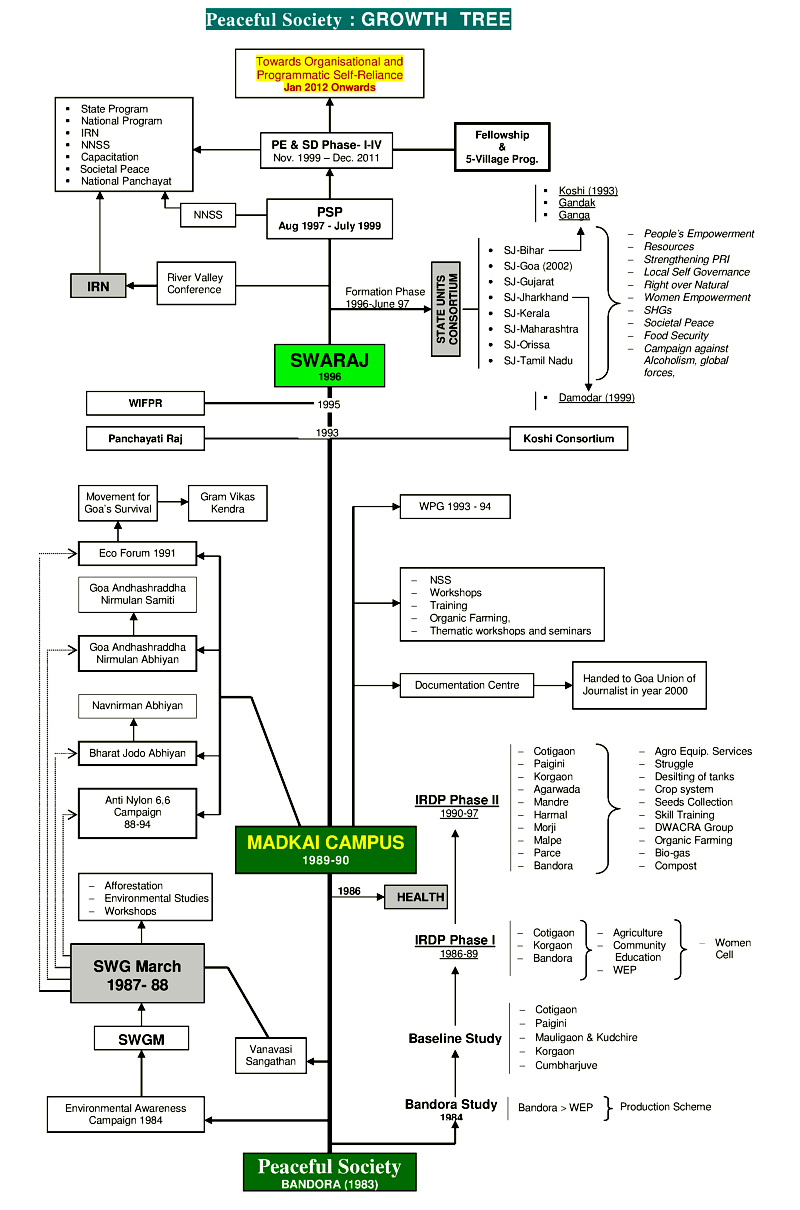Peaceful Society (PS) is a Gandhian organization, was established in 1983.

Peaceful Society Growth Tree
 While the formalities of legal registration were completed in March 1983. which began operations in Goa in 1983. Its main aims and objectives are to:
While the formalities of legal registration were completed in March 1983. which began operations in Goa in 1983. Its main aims and objectives are to:
· Undertake various socio-economic measures in agriculture, industry, irrigation and animal husbandry to improve the economic condition of those living below the poverty line
· To strive and work towards creating a more balanced ecology
· To organize training programs for youth for effective involvement in development activities
· To conduct, organize and undertake motivational and educational programs for increasing awareness on social and health issues
The renowned Goan stalwart Late Mr. Madhav Bir was its founder president and Kumar Kalanand Mani was made its Secretary.
Through the twenty years of its past existence, Peaceful Society has worked in all these fields, sometime separately but over the years with an increasing degree of integration.
PS’s original inspiration can be traced back through the Total Revolution of J.P. Narayan in the late 1970’s to Gandhiji’s dream of a peaceful society, in the personal history of two key founder members, Kumar Kalanand Mani and Bharati Bandodkar. Kalanand Mani had a background of 9 years active full-time involvement in the Sarvodaya Bhoodan Movement in Bihar and then as a fully committed participant in the JP movement and the Chhatra Sangharsha Samiti from 1974. This commitment was strengthened during the emergency when he was one of the countless youth who was arrested and after his release went underground to keep the spirit of freedom alive in the country. After the emergency he was put in charge of the national secretariat of JP’s youth wing “ Chhatra Yuva Sangharsha Vahini”. He left Bihar in Sep. 1979 with the aim to make the whole country his experimental ground and landed in a left oriented organisation “Kishore Bharati”. While with the Chhatra Yuva Sangharsha Vahini, he met Ms. Bharati Bandodkar during a national camp held in Goa in August 1978. Later as part of social commitment towards casteless society, he married Bharati in January 1980.
Impressed by the still pristine environment, both natural and social, and with the inspiration from senior Sarvodaya leaders, he decided to make Goa his new home and a base of his operation and experiment (Karmasthal). Initially he worked as a full-time activist for the Goa Sarvodaya Mandal. During this time, he tried to enter fully into the culture and life of Goa, looking to see how the principles of Gandhi’s vision of a society based on ‘mutual understanding, cooperation and collective efforts ’ could be realized in Goa.
Soon he had a cadre of like-minded youth supported by a group of older citizens to form a development group, which would present “the Gandhian model of ideal life and environment before the people” of Goa. The goal was “the improvement of the living conditions of the rural people and development of agriculture and agro based allied industries”. The principal strategy was to awaken the social spirit by making the people aware of their rights and duties, leading to the removal of “poverty, inequality, exploitation, injustice, illiteracy, and blind-faith, ecological and economical imbalance”.
The Gandhian principles of personal commitment and involvement in social development work, it was planned that the board members would take an active interest as well as actual involvement in grass root work with specific responsibility for different areas. For this reason the board members were from different areas and talukas in Goa and the first programs were planned in each of 5 areas from where the board members hailed.
Initially the task was to convince the members, all original inhabitants of Goa about the need for a poverty eradication program. All of them were convinced that Goa was not like the rest of India, that people were by and large well off, economically and socially, and that what was needed was the filling-in of gaps in the social fabric, by running an education program in some remote areas or improving street light, supporting sport activities and the like. To convince them that this was not the case, a detailed household survey was done in Bandora, in Ponda taluka, the first ‘headquarters’ of PS. Shortly afterwards, similar surveys were carried out in 5 more villages. The results of the survey clearly showed the need for broad based economic development program in favour of rural poor. And in 1984, Peaceful Society started its first organized activities in two different sectors that would determine the direction of its future in Goa and in the entire country.
